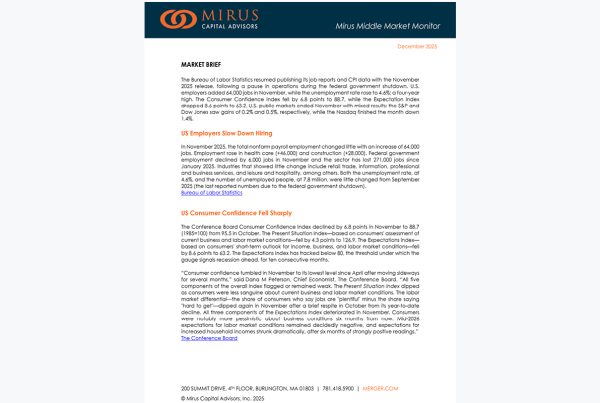Clients
For over 35 years, we’ve partnered with exceptional companies and their leaders across every stage of business ownership and growth. Our clients include closely-held and private equity-backed middle-market businesses, emerging growth companies, small cap public and large corporations, as well as Boards and Special Committees.
Board-level professionals, attorneys, and other trusted advisors consistently recommend our highly-specialized senior bankers. Our team delivers the deep industry expertise and execution excellence sophisticated clients and stakeholders demand.
We’ve completed over 450 transactions for clients representing a variety of ownership situations and transaction dynamics.
Comprehensive Advisory Solutions
- Founder-Owned Companies
- Family Businesses
- Private Equity
- Large Corporates
- Small Cap Public Companies
- Boards & Special Committees
We work with founders on what is often the most important transaction of their careers. Creating meaningful value is the foundation of every relationship we build and the unwavering commitment behind everything we deliver.
You’ve built an exceptional business, and our experienced team can help you create options by connecting you with a variety of investors and strategic buyers. Our process creates competition for your business, putting you in the driver’s seat. Whatever drives you, we’ll structure a process that honors your priorities while exploring new possibilities for value creation.
Our founder-owned clients span technology, industrial, business services, healthcare & life sciences, and consumer sectors. They are the leading companies in their respective geographies and markets. We specialize in bringing industry-leading businesses to market; successful enterprises that have earned their reputation through innovation, market leadership, and operational excellence.
When multigenerational families face transitions — whether raising capital for growth, partial liquidity events, complete business sales, or succession planning — the decisions involve far more than financial considerations. They impact family relationships, employee welfare, and preservation of values that have guided the business for decades.
We’ve worked with family-owned companies throughout our entire history and understand that successful transitions require sensitivity to both business objectives and complex family dynamics. Mirus President Andy Crain has lived your journey: he owned, operated, and sold his 5th generation family business.We understand the emotion of a family business transition, and we understand family business transitions transcend price maximization. It’s about identifying the right steward for what you’ve created.
We recognize our role extends beyond transaction execution — we guide families through every stage of the process, maintaining open communication to keep all family members fully informed. We facilitate discussions to address differing priorities, confirm that each family member is comfortable with how we’re operating, and provide clarity on what information is being shared and with whom.
As a result of our personal and professional experiences with family businesses, we understand that your family may want to give special consideration to certain people, brands, locations, or customers that prospective buyers might not recognize. We help families explore their options and navigate these deeply personal decisions while creating competitive markets that expand the universe of investors and buyers who appreciate the stability and market positions that characterize successful family enterprises.
Private equity firms recognize successful portfolio company exits require specialized expertise and established buyer relationships that maximize value while minimizing execution risk. These firms depend on investment bankers who understand the unique dynamics and demands of PE-backed companies — from growth capital needs and add-on acquisitions to strategic exits that deliver superior returns.
We’ve established deep relationships with leading private equity firms and provide tailored advice on both the sell-side and buy-side. Our comprehensive services include portfolio add-ons, full buy-side searches, and sell-side advisory. In select situations, we have also co-advised alongside notable bulge bracket firms for larger advisory engagements, bringing our differentiated company, transaction, and industry-specific insights to create truly differentiated, world-class advisory teams.
Our team has closed over $2.6 billion in transactions involving private equity over the past 5 years.
Our seasoned team with 35+ years of experience with private equity-backed businesses delivers growth capital raises, add-on acquisitions, and strategic exits that consistently exceed expectations. We partner with private equity clients across the technology, industrial, business services, healthcare & life sciences, and consumer sectors.
We understand PE firms value bankers who execute efficiently and navigate complex deal processes with sophisticated buyers. We provide the sector expertise and buyer relationships necessary to expand your opportunities and deliver superior outcomes that drive fund performance.
Large corporations turn to Mirus to evaluate and execute on strategic acquisitions and divestitures of non-core assets.
Our senior team with 35+ years in investment banking works with corporate clients across the technology, industrial, business services, healthcare & life sciences, and consumer sectors to achieve growth objectives and maximize shareholder value.
Clients value our ability to maintain confidentiality, execute efficiently, and navigate sophisticated deal processes. Our proven track record of 450+ completed transactions demonstrates the expertise and relationships necessary to expand your strategic options and achieve your corporate objectives.
Small cap public companies face unique challenges requiring specialized investment banking expertise, particularly when navigating strategic transactions or complex corporate decisions under public market scrutiny. These companies need independent analysis and strategic guidance to evaluate opportunities while meeting fiduciary duties and regulatory compliance requirements.
Our accomplished team with 35+ years in public markets works with small cap public companies across technology, industrial, business services, healthcare & life sciences, and consumer sectors to structure transactions that maximize shareholder value. Our experience with public company clients includes providing fairness opinions, advising on go-private transactions and other strategic alternatives for Boards and Special Committees.
Public companies value our ability to provide independent perspective, maintain regulatory compliance, and execute transactions efficiently while protecting shareholder interests and corporate reputation. We expand strategic options while delivering results.
Boards of Directors and Special Committees require independent, expert perspective during critical decisions including strategic transactions, governance challenges, and major corporate decisions affecting shareholder value. These situations demand objective analysis from experienced professionals who understand fiduciary duties and can provide strategic advice for informed decision-making.
Our professional team with 35+ years in board advisory works directly with Boards and Special Committees to deliver the independent analysis and advice required during their most important deliberations. Our fairness opinion and advisory services help Boards navigate complex situations with confidence, providing comprehensive evaluations during M&A transactions and going-private deals.
Corporate Boards of Directors value our ability to provide objective perspective, maintain strict independence, and deliver thorough analysis that supports prudent business judgment. We advise on the range of strategic alternatives while providing the expertise and credibility needed for critical decisions affecting shareholder value.
Let’s Start a Conversation
We’re here to help. Whether exploring options now or preparing for the future, leverage our team’s expertise for your middle market M&A transaction.














